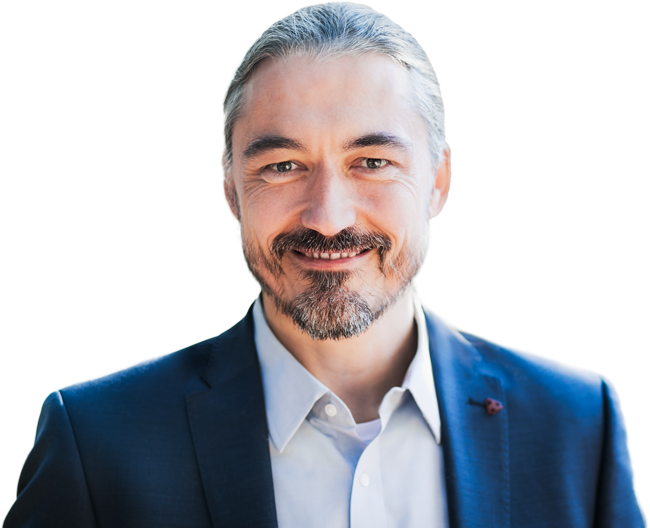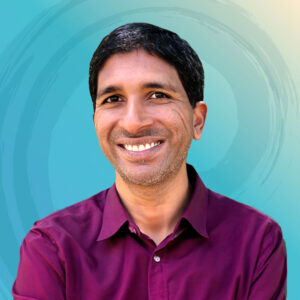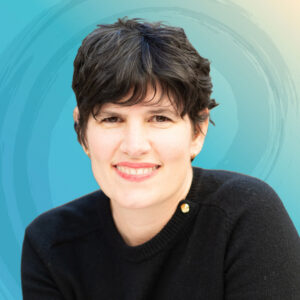Thomas Hübl explores how trauma changes our experience of time, and how integration and acceptance can help us create a better future. When traumatic events occur in the present moment, we become overwhelmed, and our experience of “presence” is split, pushing the trauma into the subconscious realm. He explains that our compartmentalized trauma is like a data package that becomes stuck in the past, interrupting the flow of time like a rock in a river. As we go through life, we experience tension, numbness, and absence– repetitive difficulties influenced by the trauma embedded in our past. Thomas provides insight into how we can embrace and integrate our pain and our defense mechanisms, and how that is a more healing and effective way to create change than trying to get rid of them.

EPISODE 16
Restoring the Future Through Embodied Trauma Integration

Share this:
Listen Now
“The past needs a future to restore itself.”
- Thomas Hübl
Guest Information

Thomas Hübl
Thomas Hübl is a renowned teacher, author, and international facilitator whose work integrates the core insights of the great wisdom traditions and mysticism with the discoveries of science. Since the early 2000s, he has been facilitating large-scale events and courses that focus on meditation and mindfulness-based awareness practices, as well as the healing and integration of trauma.
His non-profit organization, The Pocket Project, works to support the healing of collective trauma throughout the world. He is the author of the book Healing Collective Trauma: A Process for Integrating Our Intergenerational and Cultural Wounds.
His next book Attuned: Practicing Interdependence to Heal Our Trauma—and Our World will be published September 12, 2023 by Sounds True and is available for preorder on Amazon, Barnes & Noble, IndieBound, Bookshop, and more!
For more information, visit thomashuebl.com
Notes & Resources
Key points discussed in this episode include:
- Integrated history is presence. Un-integrated history causes us to project an imagined future – this is called after-time
- When we’re reactive, angry, afraid, or shut down, that pattern of reaction has its roots in the unintegrated data packages from past trauma
- Compartmentalizing has an adaptive intelligence to it – we do it to keep ourselves safe in bad situations.
- Repetitive patterns in society make us prisoners of the past. Only when these processes are onboarded through a present intervention can they be integrated into the present moment
- Meditation opens us up to creative insights about our lives and what we can contribute to the world
Episode Transcript
Thomas Hübl: Hello and welcome! My name is Thomas Hübl and this is my podcast, The Point of Relation. Today I would love to explore with you the relationship between what we call chronological time. Like, time seems to be a river or a line coming from the past – we are going towards the future. This is the present moment where we are sitting here right now and exploring a bit the notion of trauma time. What actually happens within us when we get hurt or traumatized? How does this alter or change our experience of time and also in the design of our life, how that affects our experience of time? And then I would love to look at the notion of aftertime.
So real time or chronological time, trauma time, and aftertime.
We will start with the notion of presence. Because we could say, integrated history is presence. Many people might say history lies behind us. It’s what was. And of course, on one level, that’s true. But integrated history says right now what I say or you listen is integrated history the way you are listening right now. Integrated history is millions of years of living and millions of years of learning that culminate into this very moment.
So integrated history is actually all of which flows in our life, all the data and information that flows in our life. Because when you look in your body, your body is an amazing bio-computer. And a lot of data is getting channeled up and down your spine as we’re having this podcast session, so as it’s in my body, there’s a lot of data flow. There’s a lot of information circulating. But what is information? It goes “in” and it creates a “form.” So information, whatever informs us creates and in the form. When I look at you, you inform me and I have the form of you in me. We could also say you exist within me, you intra exist in me. We intra exist in each other and in the process that we call life. It’s very important. So we inform each other. And integrated life is also well integrated data flow.
Integrated history, we could argue, is not just behind us, and it’s the past. It’s all the capacities that life developed from body organs, emotions, thoughts, complex thinking patterns, science and so on. We didn’t develop all of that, and that got developed over a long period of time. We are sitting in and as the achievements that life has.
Now when we look a little bit at presence – so presence is integrated history as this very moment being alive and active, when in the present moment something happens that is hurting or traumatizing and the impact is strongly overwhelming., presence gets split into compartmentalizing or splitting of the overwhelm, shutting down part of the hyper stress, numbing it and often pushing it into the subconscious realm, the unconscious.
When we push it away, we have a package of data being split off and basically drowning in the parts of ourselves that we can feel. At that moment we split presence into a data package that contains a lot of data that is circular. It’s like circulating in that kind of compartmentalized pocket. That’s the beginning of the recurrent repetition, compulsion of trauma. But it also means that the present moment that is part of experiencing life is a river as its flow gets partly hurt and fragmented.
Suddenly we have two: data package that get frozen. Frozen in our bodies, frozen in our emotions, frozen sometimes in our thinking and frozen in the way we relate to the world. It actually time stops for that trauma package. It gets frozen in space and time. It’s why sometimes when we become reactive or triggered, we don’t respond to the world with our full potential and capacity as a mature human being. We often react from a younger place or a place that feels really stressed or triggered or distant and numb. To the present moment could split. Because when we look at it, trauma says in a way, here in space and in time, in the traumatizing moment, it’s not good for me. Here in space and time, it’s not good for me. A child going through an overwhelming traumatization or a grown up going through an overwhelming traumatization in this moment in space and time: It’s not good for me.
So moving out of this moment, somehow in order to relieve the pain and the overwhelm, is intelligent, it helps us to survive better. It helps us to go through that overwhelm better. And so the trauma response is actually a very intelligent function. And often later on when that gets fixated, we suffer from that kind of not being present. But many people are trying to do presencing work without including the intelligence of not being present, then it becomes a bit like an effort. We are trying to be present in our life. But actually there are forces in us that intelligently left a disembodied, withdrawn, shut down, kind of protected. And these events functions need to be included in the way we want to get more present in our life.
So it’s actually finding a relationship to the defense mechanisms relating to and reowning those mechanisms instead of trying to get rid of them. We don’t want to get rid of it. You want to actually make that mechanism, our friend re-own it and that’s why it can change. In a moment, presence gets split into the past, which we could say is an integrated history. Either personal history. Ancestral history. Collective history. Global history. Everything that hasn’t been integrated yet are data packages of the past frozen in space and time. Which means they have been unhooked from the river of Time. So they are not any more swimming in the river, they are actually starting to become like the rocks in the river.
That’s why very often in life, we say, or when we run into difficulties, we want to get rid of it because it feels like a block. But the rock in the river is crystallized frozen water. It was once the river of time, but after the trauma, it became a rock. Tensions in the body, tensions in our emotions, numbness, absence, and also not anymore related spaces, but withdrawn spaces. That becomes like a rock. And that’s what we often encounter in our life is repetitive difficulties.
So when we see, oh, time has been split to trauma, information has been unhooked, frozen in time. And is now a package of the past. Every time that past comes up as a hyper reactive, maybe outgoing, very triggered information so that I become reactive, I become angry, I become very afraid. I become shut down, withdrawn and numb – that reaction or patterns that are compensations for my trauma are actually all based on the past. Not happening really now. They are happening in the past and they have their roots in the past. Which is an integrated data package.
So fragmented data packages become the source of repetitive patterns in my life. And then I say, okay, tomorrow is the future. Which is in the river of time, chronologically, there’s a flow towards the future that might be the way we look at life today. But actually if tomorrow I have the same reaction or I create the same pattern, then I am reliving the past. It’s like you’re driving on a highway and you see a sign of the city and you drive five miles more and you see the same sign again. So it seems like, Oh, I didn’t really drive because somewhere there is no exit. Because again and again I see the same city in five kilometers. And then I drive again and then I see the same city still five kilometers away.
So did I progress towards the future or did I just relive a loop of my past?
That’s why I would argue that the way we look at space and time in our society, often in the mainstream, is too limited because tomorrow is not everybody’s future. Tomorrow is often our past and when we recreate wars and we recreate historic patterns on a collective level – we are reliving similar patterns, which is an integrated path. So every time we split the present moment into the past, it needs a kind of an imaginary future. It needs a future to resolve itself. So until I integrate that trauma, I have a forward projected future. It is not the actual future. It’s just the time it needs to integrate that data package again. So I call it the “aftertime,” because that’s not really the future. That’s the time it takes to integrate what was overwhelming in the past. It’s a property of the past.
When we dream about a better world tomorrow, we are forward projecting the parts of us that are split off and fragmented that we can’t live today. That’s where we wish for it tomorrow. It’s different from the real future, which is the higher consciousness inspiration. Where we intuitively, inspirationally have a sense of the future, a sense of potential developments, a sense of innovations, a sense of breakthroughs, a sense of scientific revelation.
It is the real future. It’s not dreaming about a better world. That’s when in the present moment, because I’m either very present with something or I am relaxing for a moment. So I work on something intensively, then I take a walk in the park and because I make space – inspiration can come in. Many people experience this when they meditate, and in meditation they suddenly have a stream of creativity. Of many ideas. Have many insights of what they can manifest in my life. What are the updates of my life today? How my work can update itself, how my relationships or some way I contribute to culture.
When we are in that creativity, it feels good, why? Because we are participating in the generosity of the higher consciousness future. It’s a vertical future. It’s downloading new innovations. That’s a deep spiritual capacity. And for some people that’s very natural. They don’t even call it spiritual capacity, it’s just happening. Very creative people have that channel very open or people that bring in lots of new ideas and innovations that’s naturally accessible to them. And so that’s the future because it means it’s an update. Tomorrow is not reliving the same again. Tomorrow is an update of what was yesterday the same again. And it doesn’t mean that it changes from 0 to 100. But I see a development, I see an update, I see a growth and/or I have some very new creative insights.
So in order to bring all of this back again together. We are speaking of integrated histories, presence. An integrated history in me and integrated history in you meet. We are here. So we meet as flow. And I’m sure many of us now experience when that happens and when that meeting triggers new insights and new innovations. And it’s an inspiring conversation. And the channels are open and our neurons are gleaming because it’s uplifting – it’s beautiful.
Every time trauma happened in the past, it created frozen time pockets. Every time trauma happens now, it creates frozen time. Life stops in a trauma pocket. And gets held somewhere in space and time and fragment space and time. So I cannot be fully here and I can not be fully now. So space time gets dispersed and my sense of space, time and rhythm, the natural rhythm of life. I believe space, time and rhythm are three very important functions of our human development. Every age we went through one year, two years, three years, four years have space, time and rhythm at the core of their developmental impulse. And it synchronizes a grown up self that synchronizes a person with the collective. So if that’s traumatized, space, time and rhythm are hurt. So we feel a bit dis synchronized, not at the right place, not at the right time. And life doesn’t fully line up. Life seems not to fully flow into parts where we are hurt.
That’s why I think redefining a bit our notion of time, that emergent processes which are deeply relational, open, they have a future, they have emergence and they’re innovative. That’s where society and every human being, family systems, organizations, actually live now and have a future. The repetitive patterns, the conversation that we had already ten times and not much changed or repetitive patterns in our society – that part of society doesn’t live now. It lives as a prisoner of the past. And these processes don’t have a future only when they’re being onboarded through a present intervention. Then they can be integrated into the present moment to the way we release the past by really hinting at it.
The way how we release the past is by onboarding it, taking it back in, not trying to get rid of it. Many people try to get rid of the problems and say, without that my life would be so much better. And I say, no, that’s a part of you. Let’s bring that back in and let it integrate in order to have a future. So integration of information is post-traumatic learning. Every time we integrate a chunk of the past, which is a split of data, we integrate into the main computer, which is our body or nervous system, the central flow and the central nervous system – then the integration leads to growth. Because our perspective growths, our capacity to perceive because an integrated past creates filters. We are looking through filters like sunglasses, and we integrate that information. Suddenly we see more, we feel more, we participate more, we become more creative, more generous, more connected, more relational. More present.
Looking a bit at these different periods of time, presence, present moment, which is the birthplace of the future. The past hurt information that’s been compartmentalized. The past needs a future to restore itself. A lot of trauma therapy or trauma work or collective trauma work is actually happening in the aftertime in where the past and the aftertime meet the potential like the future that is forward projected to meet again in order to be integrated in the present moment. And that creates the fertile land for the future. Inspiration to land as a seed, and on the fertile ground and sprout. And since a lot of trauma work happens through bodies and emotions, the body is the land, emotions the water and our mind and spirit. Spirit fertilizes our minds to fertile seed. It gets planted in the fertile soil, and that’s how new developments can sprout.
And I think we all know both parts, most probably the non-emergent processes in us, when society and the emergent processes in us and in society. We want to bring the past information back into the river of time, and to give birth to the future in the present moment. And so that’s a short journey through space-time, traumatized space-time and if that’s interesting to you, you can also check out my book that’s coming out. It’s called Attunes will be available on September 12. Stay tuned and listen to the next episodes of my podcast, the Point of Relation.






